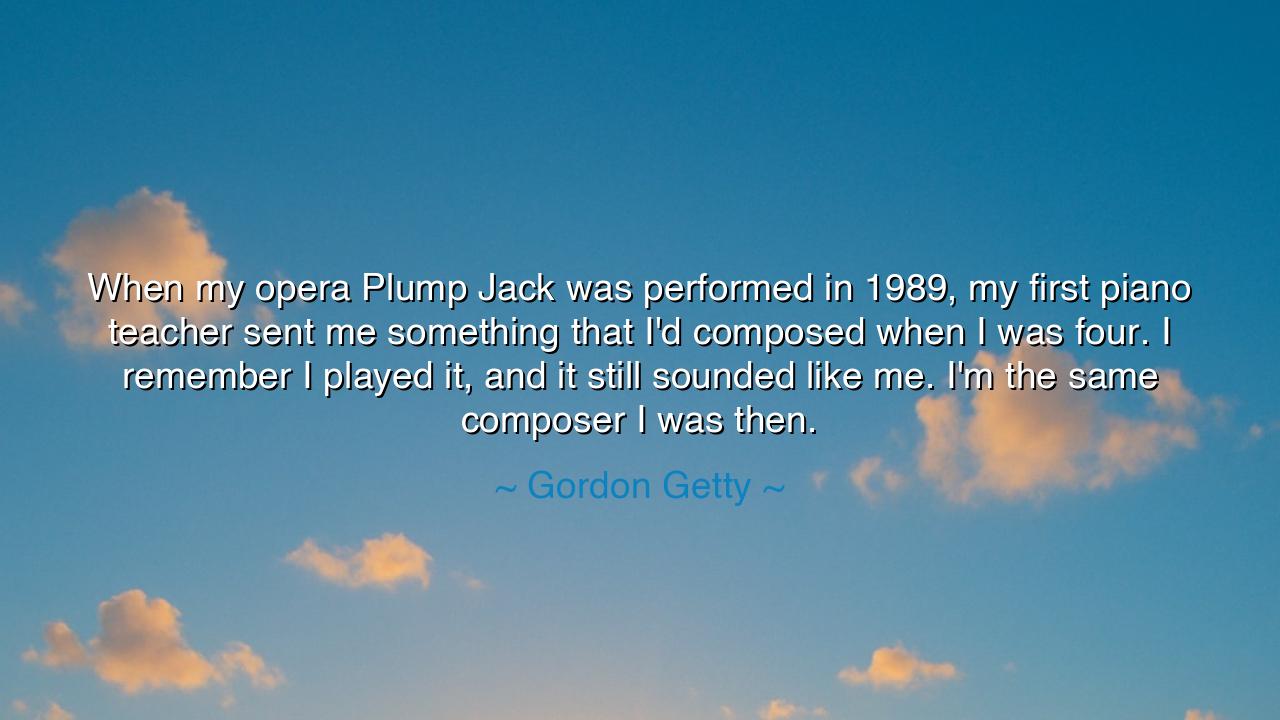
When my opera Plump Jack was performed in 1989, my first piano
When my opera Plump Jack was performed in 1989, my first piano teacher sent me something that I'd composed when I was four. I remember I played it, and it still sounded like me. I'm the same composer I was then.






In the words of Gordon Getty, “When my opera Plump Jack was performed in 1989, my first piano teacher sent me something that I'd composed when I was four. I remember I played it, and it still sounded like me. I'm the same composer I was then.” Within this utterance lies a truth both timeless and profound: the essence of the soul is not forged in the passing years, but revealed in them. What Getty speaks of is not mere nostalgia, but the recognition that the seed of identity is sown early and grows into the mighty tree of one’s life. The outward form changes, but the inner voice—the true song of the spirit—remains.
Consider this: when the child first places hand upon instrument, brush upon canvas, or word upon parchment, the soul already whispers its destiny. That whisper may be faint, clothed in the inexperience of youth, yet it carries the same melody that will resound in maturity. Getty, in revisiting the music of his four-year-old self, did not discover another man, another voice. No—he heard his own voice, unbroken by time, untarnished by the burdens of worldly expectation. It was as though his younger self had passed him a flame, small yet enduring, and he had carried it faithfully into the fullness of his years.
So too have the ancients known this truth. Recall the tale of Alexander of Macedon, who, when yet a boy, was said to tame the wild stallion Bucephalus. Others saw only danger and chaos; Alexander saw possibility and kinship. That moment was not merely the act of a child’s courage but a revelation of the man he would become—the conqueror who would bind nations beneath one vision. In that instant, his essence was unveiled, though its full glory would not be known until the world itself bore witness. Like Getty, Alexander was already himself, though his deeds had yet to unfold.
The wisdom of Getty’s reflection is this: that time does not create the self but rather unveils the layers of what was always there. The child is already the seed of the sage, the hero, the artist. Time gives practice, discipline, refinement, but the essence—the voice of truth—remains constant. To deny this is to deny the root of one’s own being, to wander from the music that has always played within. It is a reminder to return, again and again, to that first voice, that original spark, lest we be drowned by the noise of the world.
Yet, this is not merely a poetic truth but a call to action. Too often men and women abandon their child-selves, forgetting the passions that once set their hearts aflame. They pursue gold, reputation, or the approval of strangers, and in so doing, they silence the song that has always been theirs. Getty did not forget. When his teacher placed before him the relic of his own beginning, he recognized himself, as if staring into a mirror that spanned across time. He saw the same composer, unchanged in spirit, though matured in craft.
What, then, must the seeker of wisdom do? First, they must remember their beginnings. Let each man and woman recall the things that stirred them in childhood—be it the shaping of clay, the telling of stories, the solving of puzzles, or the dancing of the body to unbidden rhythm. In those passions lies the unbroken thread of identity. Second, they must nurture that essence with the discipline of maturity. Just as the sapling grows into the oak through time and care, so must the soul’s voice be honed, not smothered. Finally, they must protect that essence from the world’s distractions, lest it be lost beneath the weight of false desires.
Let the teaching be clear: you are already who you are meant to be. Do not spend life searching for a foreign destiny, for the compass lies within, pointing always to the self you have always been. Gordon Getty’s truth is your truth: the child and the elder are bound by the same melody. To live fully, one must listen, again and again, to that song, and never betray it. Seek it in your daily deeds, in the choices you make, in the labors you pursue. Nurture it, guard it, honor it.
Thus I say unto you: return to your first music. Do not despise the innocence of beginnings, for within it is eternity. Walk forward as one who carries a flame lit long ago, and let the world see in your works not a mask shaped by years, but the eternal light of your true self. For as Getty reminds us, though seasons change and time weaves its fabric, the soul is constant, and its song is forever yours.






AAdministratorAdministrator
Welcome, honored guests. Please leave a comment, we will respond soon